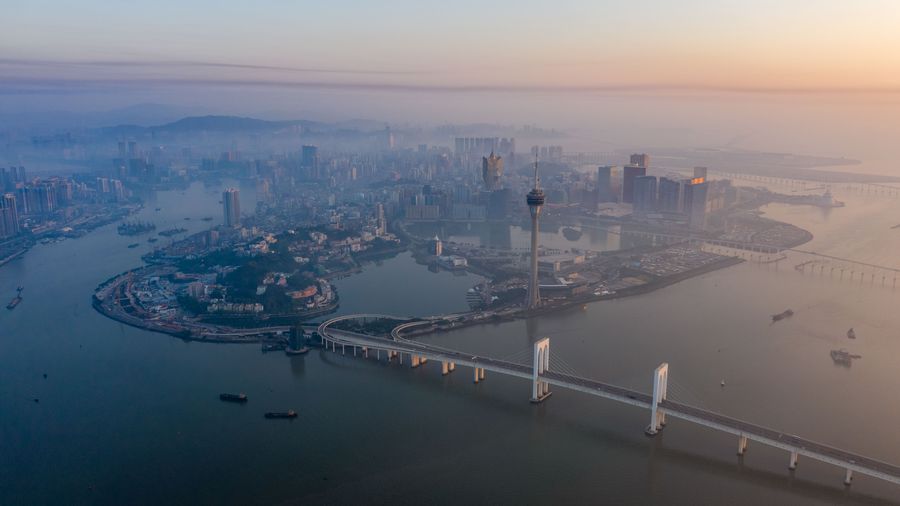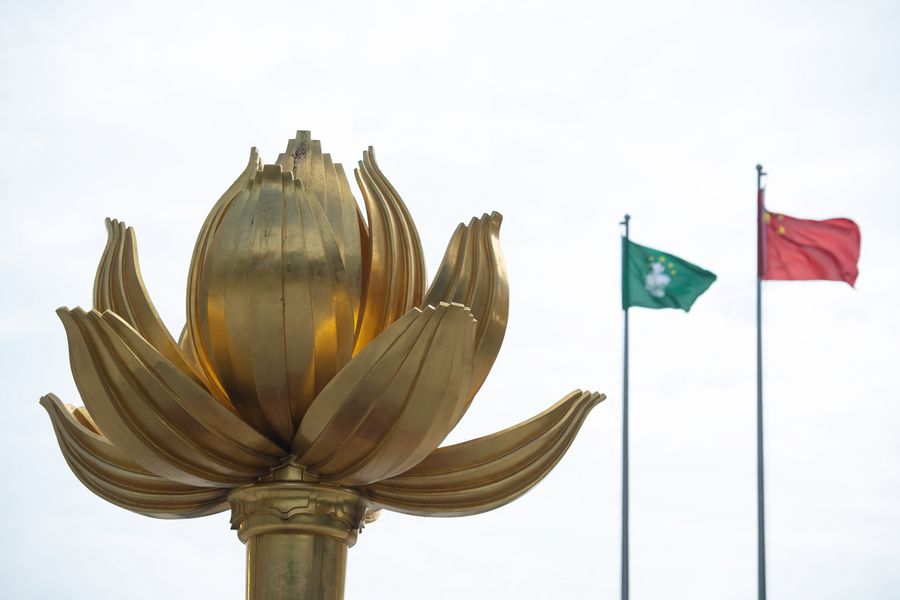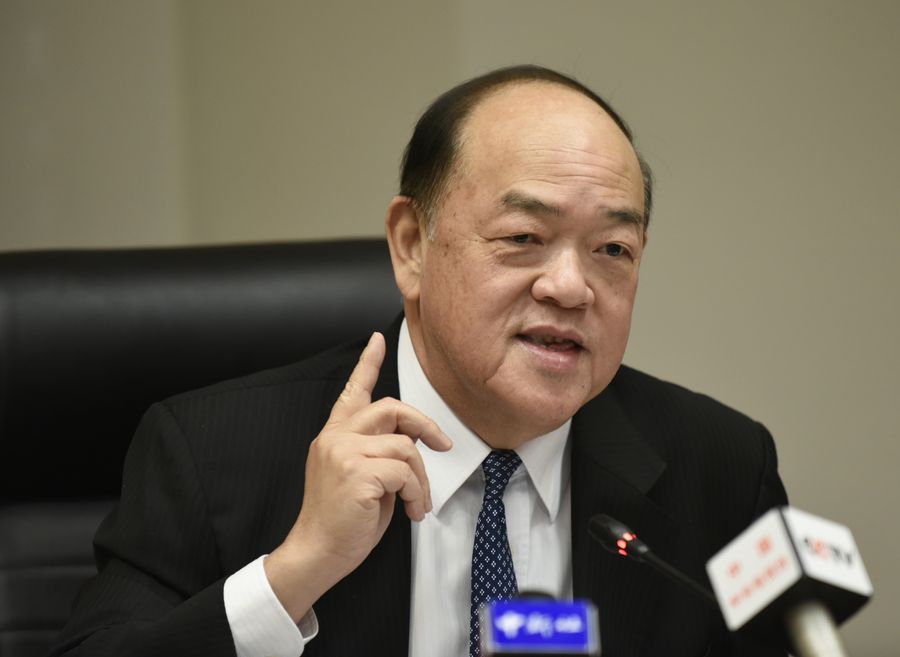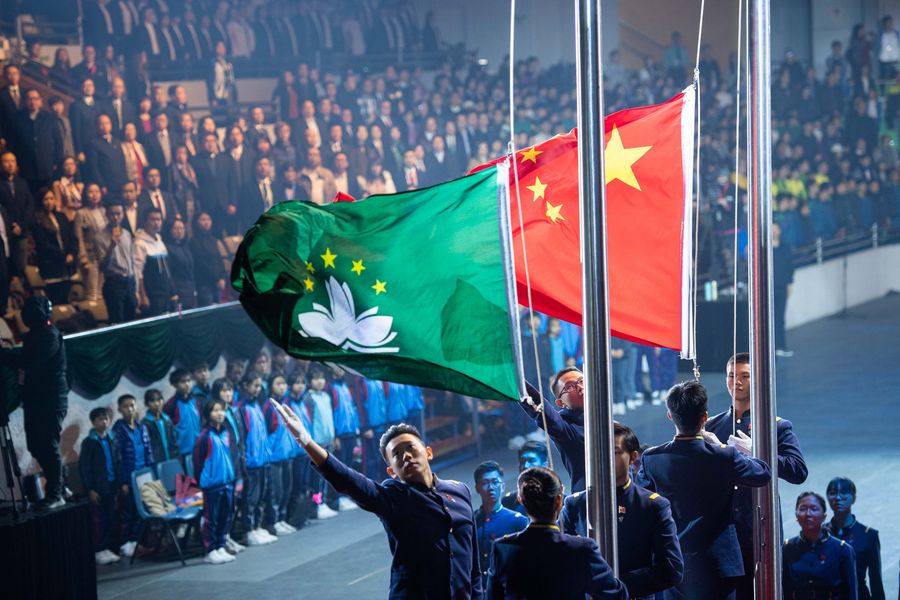During the past 20 years, China's Macao has experienced profound changes to become a flourishing international free port with its per capita GDP and life expectancy among the highest in the world.
Macao's transformation has demonstrated to the world a successful practice of "one country, two systems," a fundamental national policy formulated and continuously improved by Chinese leaders to resolve sovereignty-related questions arising from the nation's complicated past.
by Xinhua writers Zhao Qing, Zhang Ning, Wang Chenxi
MACAO, Dec. 18 (Xinhua) -- On an ordinary day before Christmas, tourists from various parts of the world were seen at the Ruins of Saint Paul's complex, the A-Ma Temple and other heritage sites of Macao, a colorful and enchanting city with a unique fusion of Eastern and Western cultures.
Containers were piled like mountains at the Ka Ho Harbour and large crowds of travelers were crossing the Gongbei Port linking Macao with the mainland.
Three cross-sea bridges connecting different parts of Macao, and the Hong Kong-Zhuhai-Macao Bridge, the world's longest cross-sea bridge, stretched across the sea surface like four beautiful ribbons.
Looking out, Macao's modern high-rise skyline merged into the prosperous world-class city cluster of the Guangdong-Hong Kong-Macao Greater Bay Area.

Scenery of Macao Peninsula in south China, Nov. 18, 2019. (Xinhua/Cheong Kam Ka)
Macao is ready to host a grand celebration on Friday to mark the 20th anniversary of its return to the motherland.
During the past 20 years, the Macao Special Administrative Region (SAR), once burdened with a floundering economy and notoriously poor security, has experienced profound changes to become a flourishing international free port with its per capita GDP and life expectancy among the highest in the world.
Macao's transformation has demonstrated to the world a successful practice of "one country, two systems," a fundamental national policy formulated and continuously improved by Chinese leaders to resolve sovereignty-related questions arising from the nation's complicated past.
SUCCESSFUL PRACTICE OF "ONE COUNTRY, TWO SYSTEMS"
On Dec. 20, 1999, standing under the regional and national flags, 44-year-old Ho Hau Wah was sworn in as the first chief executive of the Macao SAR.
"I made two promises: one was to implement the Basic Law without compromise to make 'one country, two systems' a success in Macao; the other was to try my best to deliver a Macao where people could live and work in peace and contentment," Ho, now vice chairman of the 13th National Committee of the Chinese People's Political Consultative Conference, told Xinhua in a recent interview.
"Macao residents of all ages have a full and accurate understanding of the Basic Law and the Constitution. This has led to the smooth implementation of the 'one country, two systems' with Macao characteristics," he said.

Sculpture of golden lotus in Macao, south China, Dec. 13, 2019. (Xinhua/Cheong Kam Ka)
Macao has enjoyed a long tradition of loyalty to the motherland even before its return in 1999. Since then, the tradition has been maintained and enhanced at different levels of government and within society, with the Constitution and the Basic Law advocated by all people, incumbent Chief Executive of the Macao SAR Chui Sai On told Xinhua.
One key to Macao's successful practice of "one country, two systems" is that the Macao SAR has well implemented the requirements by the central government, said incoming Chief Executive Ho Iat Seng, who will be sworn in as the fifth-term chief executive Friday on the anniversary day.
GREATER PROSPERITY, STABILITY
Twenty years have flown by since Macao's return to the motherland, during which it drew international attention with its tremendous development.
Macao's gross domestic product soared to 54.6 billion U.S. dollars in 2018 from 6.1 billion U.S. dollars in 1999, with its financial reserves and foreign exchange reserves growing exponentially.
Employment now is almost full and the government has done its utmost to promote a strong social welfare system including public security, housing, education, medical care, job training and disaster prevention. Macao residents enjoy a stronger sense of happiness and gain.
"Macao residents' happiness index is high," said Fu Ziying, director of the Liaison Office of the Central People's Government in the Macao SAR, citing various social welfare benefits provided by the SAR government.
Macao people aged 65 and above receive a combined allowance of up to 6,099 Macao patacas (about 760 U.S. dollars) every month, he said.
All students enjoy free education for 15 years. Since 2007, the SAR government has been distributing year-end bonuses of up to 10,000 Macao patacas to all residents.
To promote economic growth, Macao has in recent years been striving to diversify its economy while taking on new roles as an international tourism and leisure center, a platform for trade cooperation between China and Portuguese-speaking countries and an active participant of the Belt and Road Initiative, among others.
In the outline development plan of the Guangdong-Hong Kong-Macao Greater Bay Area unveiled earlier this year by the central government, Macao is listed as one of the four core cities in the area to serve as one of the core engines for regional development.
These moves fully demonstrated the central government's strong support for Macao to integrate into the overall development of the country, and will greatly promote the infrastructure connectivity and smooth flow of personnel and goods between Macao and the mainland, Ho Iat Seng said.

Ho Iat Seng, incoming chief executive of China's Macao Special Administrative Region (SAR), speaks with Xinhua in Macao, south China, Nov. 20, 2019. (Xinhua/Xu Liang)
"We hope the central government and all departments will continue to provide help to Macao. Macao will also try its best to make greater contributions to the overall development of the country," said Ho.
The Macao SAR has also made impressive achievements in its external exchanges, bringing the number of international organizations it has joined to 120 from 51 before its return, Commissioner of the Ministry of Foreign Affairs in the Macao SAR Shen Beili told Xinhua.
DEEP-ROOTED PATRIOTISM
All Macao residents have a clear understanding that Macao is backed by a strong motherland and the support of 1.4 billion compatriots, according to Ho Hau Wah.
Patriotic education is deep-rooted in schools, youth societies and government agencies, which has helped pass the torch of patriotic tradition from one generation to the next, he said.
Macao residents consciously align their own fate with that of the motherland, seeking their development opportunities within the overall development plan of the country.
He acknowledged that there were times when people differed with the government. "But Macao residents have never wavered in their confidence in 'one country, two systems,' and their feelings for the motherland have never weakened," Ho said.

Students attend a flag-raising ceremony during a gala performance celebrating 20th anniversary of Macao's return to motherland in south China's Macao, Dec. 6, 2019. (Xinhua/Cheong Kam Ka)
Macao's success can be seen in its harmony and inclusiveness, where loving both the motherland and Macao has become a mainstream value, according to Fu Ziying.
Fu said the Macao SAR government has attached great importance to cultivating patriotism among the youth. The national flag is hoisted in all educational institutions and various patriotic education activities are held regularly.
A great number of cultural exchange activities between the mainland and Macao, especially among teachers and students, have boosted mutual understanding. Since 2016, more than 3,000 Macao students have toured the mainland under a Macao SAR government-sponsored plan.
"I will continue to unite all members of society to push forward 'one country, two systems' and build a more prosperous and beautiful Macao," Ho Iat Seng said.
(Video reporters: Lin Ning, Qiu Bo, Jiang Chao; Video editor: Li Ziwei) ■



